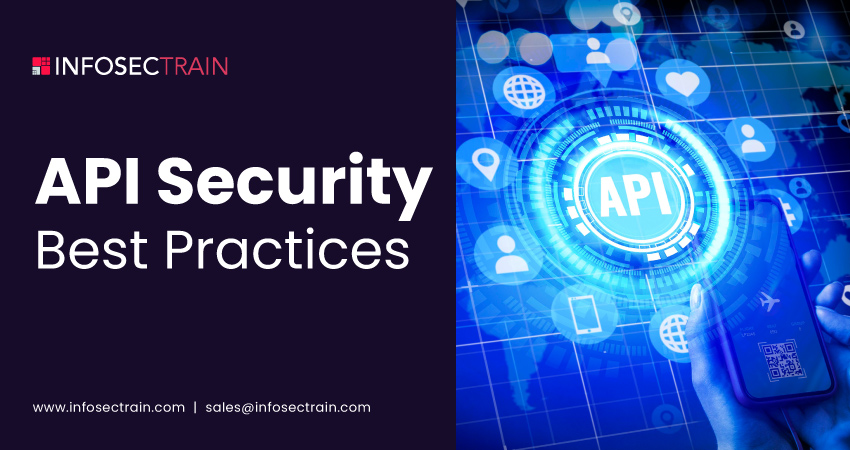Top 10 API Security Best Practices
Application Programming Interfaces (APIs) have emerged as an integral part of modern IT infrastructure within businesses. They provide the seamless exchange and integration of data across various applications, services, and systems and enhance businesses’ digital capabilities. However, like any technological innovation, APIs come with different security challenges that companies need to address. This article will cover API security and the essential best practices businesses need to implement to protect their digital assets.

What is API Security?
API security encompasses a range of procedures and protocols implemented to protect the security and integrity of Application Programming Interfaces (APIs) from unauthorized access, data breaches, and other malicious attacks. It involves several security measures, such as authentication, authorization, encryption, input validation, and other processes, to guarantee that only authorized users and applications may access and interact with APIs.
APIs are a collection of rules and protocols that facilitate the exchange of information and interaction across various software applications. They enable data sharing, functionality access, and integration between multiple systems within an organization and across the internet. In today’s interconnected and API-driven world, implementing robust API security measures is crucial to protect sensitive data and uphold the reliability and integrity of digital services and systems.
API Security Best Practices
Following are some best practices for API security:
1. Authentication and Authorization: API security relies heavily on authentication. It ensures that only authorized users and applications can access your APIs. Implement robust authentication mechanisms like API keys, JSON Web Tokens (JWT), or OAuth to enhance security and enforce fine-grained authorization rules to control access to specific API resources.
2. API Versioning: Maintain API versioning to ensure that older versions of APIs remain compatible with newer versions. It will allow clients to select the desired API version, reducing interruptions that may occur during upgrades.
3. Input Validation: APIs should validate and sanitize all user inputs to protect against injection attacks like SQL injection and Cross-Site Scripting (XSS). Implement effective input validation to prevent the injection of malicious code through API requests, enhancing the resilience of your system against prevalent security flaws.
4. Data Encryption: To ensure the security of your data while it is being transmitted, use encryption protocols like HTTPS (SSL/TLS). Encryption ensures that data transmitted between customers and your API remains confidential and cannot be eavesdropped by malicious actors. It is imperative to update cryptographic libraries regularly.
5. Rate Limiting: Implement API rate-limiting measures to mitigate potential misuse or excessive utilization of your API resources. Setting rate limits will safeguard your system from Denial-of-Service (DoS) attacks and provide equitable resource distribution across users.
6. API Security Testing: Regularly check your APIs for vulnerabilities by conducting penetration testing, security assessments, code reviews, and automated scanning tools. Identify and address security issues promptly to mitigate the risk of exploitation by potential threats.
7. API Security Gateway: Use API gateways as a central hub for managing the security of APIs. It can protect your APIs against malicious attacks and handle authentication, rate limiting, and other security-related tasks.
8. Error Handling: Avoid disclosing sensitive information in error messages that malicious individuals might potentially abuse. Instead, provide clients with generic error messages while logging detailed errors internally for troubleshooting purposes.
9. Incident Response Plan: Develop a thorough Incident Response Plan (IRP) outlining the necessary steps to take in case of a security breach or API compromise. A well-equipped response can minimize damage, reduce recovery time and costs, and preserve evidence for legal or regulatory purposes.
10. Third-Party API Assessment: When using third-party APIs for your application, thoroughly assess their security practices and ensure they meet your security needs. The security of third-party APIs may directly affect the overall security posture of your company.
Apart from these best practices, you should also consider using API Security Monitoring and Logging. Monitor API traffic and logs continuously to identify any unusual activity and security incidents promptly. Implement a reliable Security Information and Event Management (SIEM) system to automate the process and enable timely responses to security issues.
Related blogs:
- Top Security Testing Interview Questions
- Difference Between Penetration Testing and Vulnerability Assessment
- Top Penetration Testing Trends to Follow
- What is Network Penetration Testing?
How can InfosecTrain Help?
For a more in-depth understanding of API security individuals can join InfosecTrain‘s CompTIA Security+ and Certified Ethical Hacker (CEH) certification training courses. These programs offer comprehensive insights into cybersecurity, equipping learners with essential skills to identify and counter security threats in various IT environments effectively. Our program offers instructor-led training, hands-on experience with various vulnerabilities, real-world scenarios for practical understanding, interactive training sessions, and Q&A rounds.

TRAINING CALENDAR of Upcoming Batches For Security+ SY0-701
| Start Date | End Date | Start - End Time | Batch Type | Training Mode | Batch Status | |
|---|---|---|---|---|---|---|
| 03-May-2025 | 08-Jun-2025 | 19:00 - 23:00 IST | Weekend | Online | [ Open ] | |
| 25-May-2025 | 05-Jul-2025 | 19:00 - 23:00 IST | Weekend | Online | [ Open ] | |
| 28-Jun-2025 | 03-Aug-2025 | 19:00 - 23:00 IST | Weekend | Online | [ Open ] | |
| 26-Jul-2025 | 31-Aug-2025 | 19:00 - 23:00 IST | Weekend | Online | [ Open ] |






 1800-843-7890 (India)
1800-843-7890 (India)